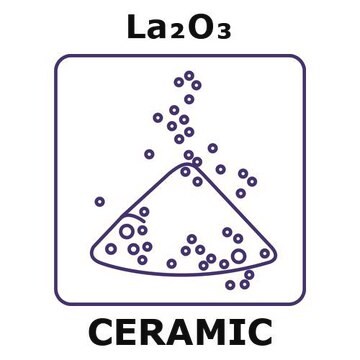199923
Lanthanum(III) oxide
99.99% trace metals basis
Synonym(s):
Dilanthanum trioxide, Lanthanum oxide, Lanthanum trioxide, Lanthanum(3+) oxide
About This Item
Recommended Products
Assay
99.99% trace metals basis
form
powder
reaction suitability
reagent type: catalyst
core: lanthanum
density
6.51 g/mL at 25 °C (lit.)
application(s)
battery manufacturing
SMILES string
O=[La]O[La]=O
InChI
1S/2La.3O
InChI key
KTUFCUMIWABKDW-UHFFFAOYSA-N
Looking for similar products? Visit Product Comparison Guide
General description
Application
It can be used as a recyclable catalytic system for the synthesis of diphenyl sulfides and selenides and for the C-N cross-coupling of aryl halides with heteroaromatic amines.
It can also be used as a promoter or support material for the selective oxidation of methanol over gold catalyst.
Features and Benefits
- High refractive index
- Low dispersion
- Colorless in the glass matrix
- Efficient, inexpensive, and recyclable catalyst
Storage Class Code
13 - Non Combustible Solids
WGK
WGK 3
Flash Point(F)
Not applicable
Flash Point(C)
Not applicable
Personal Protective Equipment
Certificates of Analysis (COA)
Search for Certificates of Analysis (COA) by entering the products Lot/Batch Number. Lot and Batch Numbers can be found on a product’s label following the words ‘Lot’ or ‘Batch’.
Already Own This Product?
Find documentation for the products that you have recently purchased in the Document Library.
Customers Also Viewed
Articles
Rechargeable solid-state batteries are becoming increasingly important due to wide-spread use in computers, portable electronics, and vehicular applications.
The prevailing strategies for heat and electric-power production that rely on fossil and fission fuels are having a negative impact on the environment and on our living conditions.
Our team of scientists has experience in all areas of research including Life Science, Material Science, Chemical Synthesis, Chromatography, Analytical and many others.
Contact Technical Service










